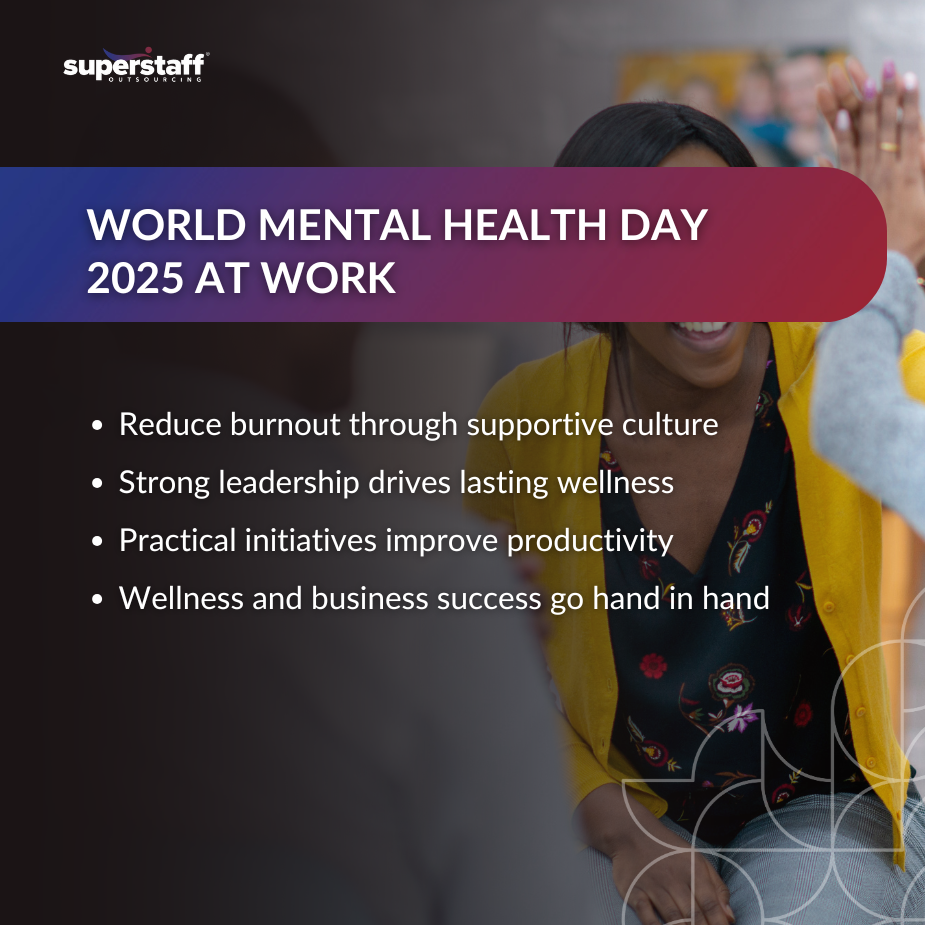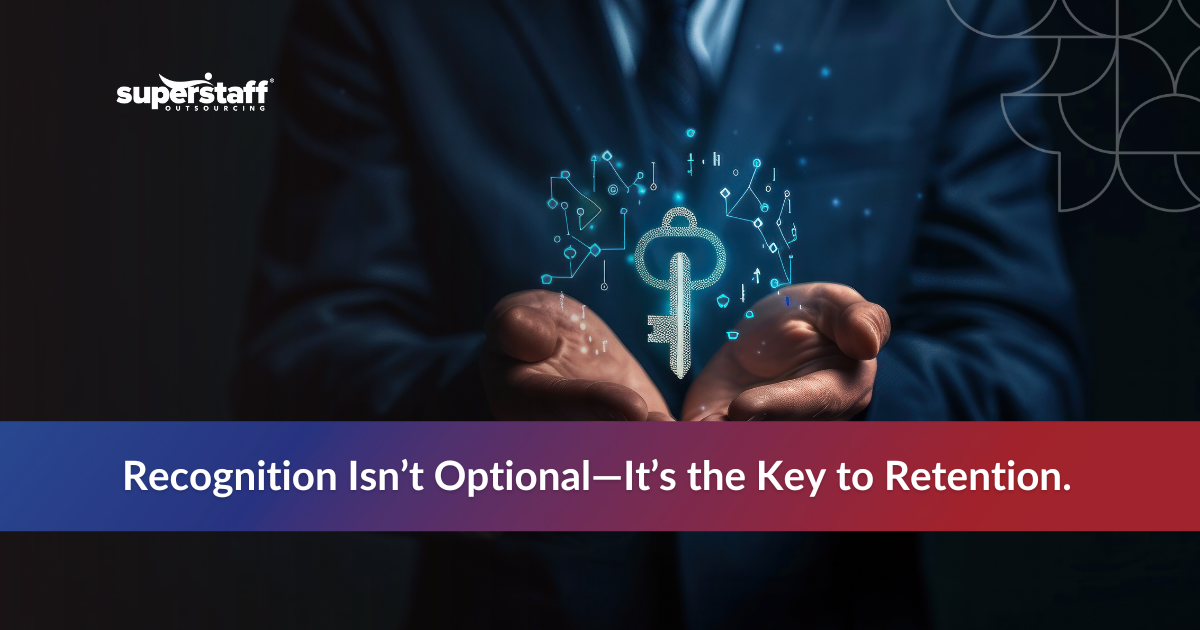
As businesses worldwide observe World Mental Health Day 2025, the conversation around employee well-being has never been more important. Mental wellness is no longer a side note in corporate discussions; it has become a central part of how organizations think about productivity, engagement, and long-term sustainability.
For today’s leaders, creating workplaces that nurture both performance and wellness is not simply good ethics—it is a business necessity.
This year offers decision-makers an opportunity to pause, reflect, and build stronger frameworks for mental health at work. By aligning their efforts with the spirit of World Mental Health Day 2025, the companies that embrace this shift will not only safeguard their people but also sharpen their competitive edge.
Why World Mental Health Day Matters for Businesses
World Mental Health Day 2025 is a timely reminder that companies have a direct influence on employee well-being. Around the world, stress levels in the workplace continue to rise, and organizations that overlook mental wellness often face the consequences of lost productivity and diminished morale.

Burnout and absenteeism are not just HR issues; they directly affect bottom lines. Replacing employees who leave due to poor mental health support is costly, and disengaged staff can stall business momentum. Beyond operational impact, stakeholders now expect mental health to be embedded within ESG and corporate responsibility efforts.
For executives, this day is a call to recognize that supporting mental health is not optional. It is central to building high-performing, sustainable businesses in a fast-changing world.
Breaking the Stigma Around Mental Health
Even as awareness grows, stigma continues to be a major barrier. Many employees hesitate to share their struggles, worried that doing so could affect their careers. This silence often leads to greater stress and, in many cases, avoidable attrition.
Leaders who take a transparent and human approach can help shift perceptions. When managers openly share their own boundaries or speak about the importance of balance, it signals that conversations about wellness are not signs of weakness but of strength. Corporate mental wellness programs, such as Employee Assistance Programs or confidential counseling, provide employees with safe spaces to seek help without fear of judgment.
Stigma thrives in silence. By normalizing dialogue and embedding openness into company culture, businesses give their people the permission to seek support early, creating a healthier and more resilient workforce. World Mental Health Day 2025 highlights why removing stigma is as vital as launching wellness programs themselves.
Building a Culture of Mental Wellness
Workplace wellness cannot be reduced to a single campaign or a wellness day. A true culture of wellness means embedding well-being into company values and everyday practices. For employees, culture is not what appears in mission statements; it is what they experience daily.
Flexible work arrangements are one way organizations are addressing the need for balance, giving staff the chance to recharge without compromising productivity. Training managers to identify early signs of burnout allows interventions before problems escalate. Recognition programs that highlight both performance and effort also play a role in creating environments where employees feel valued for more than just output.
This kind of cultural foundation ensures that wellness is not treated as an afterthought but as part of the DNA of how a company operates. And when culture is right, every other strategy is easier to implement. World Mental Health Day 2025 encourages companies to measure progress not only in revenue but also in how their culture supports employee health.
Practical Workplace Initiatives for Mental Health
Ideas matter less without action. Companies that translate values into initiatives create meaningful impact. Wellness days, for example, offer employees much-needed mental health breaks that go beyond traditional sick leave. Workshops on mindfulness, stress management, and resilience build practical skills employees can use both at work and in their personal lives.
Team activities, whether in person or virtual, help build connections and reduce feelings of isolation. Something as simple as scheduling informal check-ins or community-building events can significantly reduce workplace stress. These initiatives extend beyond office walls, influencing how employees show up for their families and communities.
When wellness is actively practiced, it creates a ripple effect. Employees bring their best selves to work, teams perform better, and customers ultimately benefit from more engaged service. By reflecting on World Mental Health Day 2025, companies can find inspiration to turn intentions into consistent practice.
The Role of Leadership in Driving Mental Wellness
Culture is set at the top, and mental wellness initiatives succeed or fail depending on leadership. When executives model healthy boundaries—like logging off after work hours or prioritizing rest—they give permission for employees to do the same.
Leaders who encourage open communication and feedback foster trust, creating environments where employees feel heard. Beyond words, leadership accountability comes through action. Tracking wellness initiatives and reporting on progress ensures that mental health is treated with the same seriousness as other business priorities.
By placing wellness on the leadership agenda, companies reinforce the message that mental health is as essential as revenue, customer satisfaction, or innovation. World Mental Health Day 2025 reinforces this truth by showing that businesses thrive when leadership and wellness align.
Mental Wellness as a Driver of Business Success
There is a direct link between mental wellness and business success. Companies that prioritize wellness see lower turnover, improved performance, and more loyal teams. Employees who feel supported are more creative, collaborative, and committed.
Consider the customer experience. Happier employees naturally deliver better service, strengthening relationships and brand loyalty. Fewer absences mean smoother operations, while reputations as supportive employers help attract top talent in competitive markets.
In short, prioritizing mental wellness is not just a moral obligation; it is a growth strategy. Businesses that understand this connection position themselves for stronger performance in both the short and long term. World Mental Health Day 2025 serves as a clear reminder that investing in wellness translates directly into financial and cultural dividends.
How SuperStaff Champions Employee Mental Health
At SuperStaff, mental wellness has always been a cornerstone of how we operate. We believe that taking care of our people is the surest way to take care of our clients. Our initiatives are designed to support employees beyond their roles, ensuring they thrive both personally and professionally.
Work-life balance campaigns remind teams that rest is not a luxury but a necessity. Flexible scheduling allows employees to manage both personal responsibilities and professional commitments without feeling overwhelmed. Internal recognition programs celebrate effort and commitment, reducing the risk of burnout.
We also invest in health and wellness webinars, counseling resources, and community support systems. By weaving wellness into every part of our employee experience, we create a workplace where people feel safe, valued, and motivated to give their best.
This approach has allowed us to maintain high levels of engagement and client satisfaction, proving that mental wellness and business success go hand in hand. World Mental Health Day 2025 strengthens our resolve to continue these efforts, reminding us that wellness is always a priority.
Building a Sustainable Future of Work
World Mental Health Day 2025 serves as a reminder that businesses cannot separate well-being from performance. Companies that invest in workplace strategies for mental health and design corporate mental wellness programs are not just protecting their people—they are safeguarding their own future. More importantly, they are demonstrating that creating a culture of mental health awareness at work is an essential foundation for sustainable success.
The path forward requires leaders to embed wellness into culture, break down stigma, and lead by example. When wellness becomes a priority, businesses create environments where employees and companies alike can thrive.
At SuperStaff, we believe that the most successful organizations of tomorrow will be those that prioritize both performance and people. As companies reflect on World Mental Health Day 2025, the message is clear: businesses that embed wellness into their culture will be the ones to thrive.
If your business is ready to partner with a provider that places mental wellness at the core of its culture, SuperStaff is here to help you build a future where employees are not just productive but truly supported.






